现代商务英语综合教程第一册Chapter 1
商务英语综合教程(上册)Unit 1 Advertising

attracting customers. In practically every such program some form of advertising is used. The type of advertising selected and the amount of money devoted to it depend on the nature of each individual business.
Text
Unit 1 Advertising
9 A department store in a large city has a more
complicated problem. It has to draw its customers from areas far beyond walking distance of its location. A much more aggressive advertising program is therefore necessary. Department stores use a combination of advertising methods. They run advertisements in newspapers and other periodicals, mail brochures and catalogues to potential customers, and insert special advertisements in monthly statements to charge-account customers. Many department stores also advertise on the radio and television.
综合英语课程Unit1
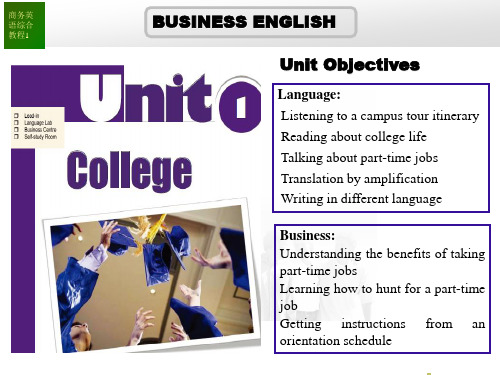
7. Singapore 8. Germany
< Back Next > Home
商务英 语综合 教程1
Lead-in
Task 2 Describe the following campus activities and tell which interests you most.
< Back
Next >
< Back
Next >
Home
商务英 语综合 教程1
Lead-in
Task 3 Listen and fill in the following blanks. Script:
Campus guided tours are led by our specially selected team of UW students who combine knowledge of our historic campus with information about the student experience. During the tour you’ll have the chance to ask questions about academics, living on campus, research opportunities, studying abroad, and all the great things to do in the Emerald City. Guided tours are offered Monday through Friday, at 10:00 a.m. and 2:00 p.m. They leave from Schmitz Hall, 3rd floor lobby, and last 70 minutes. They are also offered on Saturdays and Sundays beginning at 10:30 a.m. and leaving from the Statue of George Washington. On state holidays or the Saturday following a state holiday, tours are not offered.
综合英语教程第一册Unit One My first job

Topic: Unit 1 My First JobTeaching Objectives:1. Function: greetings & farewells2. Grammatical Point: this/that be + n. or adj.Teaching Methods:Lecture; Pair work; DiscussionThe Important/Difficult Points:1. The basic concepts of first/given and last/family names2. The structures for identifying/introducing people3. Practicing classroom English4. Practicing different ways of greeting and introducing/identifying people5. The meanings and usage of some colloquial, routinized expressions6. The cultural implications in the proverbTeaching Procedures:P1 Listening and Speaking Activities1. Introduction of functions1) Greet the class and introduce yourself by using some pictures to familiarize the students withthe basic concepts of first/given and last/family names and the structures for identifying/introducing people.2) Activity 1: Draw a rough sketch of themselves or somebody they know, and then ask eachother questions about the pictures they are showing to each other.3) Summarize the questions and structures used in performing the function of greetings andfarewells.2. Listen and speak1) Ask the students to identify the job of the woman in the picture, and then speak on her behalf.Get the students to fill up the blanks while listening to you. Lastly, check the answers.2) Play the tape one or two times and get them to do Conversation One and Two. Then, selectsome students to give answers. Lastly, check the answers and correct mistakes in their pronunciation if any.3) Key points:“I’m” is more common in speaking than “I am” which is often used for the emphatic purpose in such a contrast as “but he isn’t”. Other contractions often used in conversational English include the following: it’s = it is/has I’d like = I would like he’s = he is/has let’s = let us you’re = you are don’t = do not3. Try to speak moreConversation One:1) Explain the language in Conversation One by using Useful Structures and Expressions. Then,organize reading aloud practice and correct pronunciation problems.2) Have the students make a new conversation by using the substitutes word. Then, have one ortwo pairs of students present the conversations they have made up.3) Ask questions to check their understanding of first name and last name/family name.4) Key points:Friendly greetings can be followed by an offer of help: Hi, may I help you?Possible answers: No. Thank you. I have been helped. I’m being helped.Introduce middle name and initials such as: Allen D. Wallace A.D. WallaceIn some types of writing, such as dictionary entry or bibliography, a person’s name can also be written in the form: Wallace, A.D.Conversation Two:1) Have the students read aloud, check their pronunciation. Then, ask them to make a newconversation by using the substitutes. After that, have one or two pairs of students demonstrate the dialogue they have made. Finally, highlight Useful Structures and Expressions by writing them on the blackboard.2) Key points:Will + be + v-ing: the future continuous tense for a scheduled event which is coming soon.It’s been nice talking to you: In American English, people also use “It’s nice to talk to you.”Goodbye and good luck: A farewell used especially when you and your friend are not expected to see each other for a long time.I’m flying back…: The present continuous tense indicates a scheduled action in the near future.write to: write a letter/an e-email tohave a happy landing: a farewell used only to people who are going to make a plane trip3) Activity 2: Spelling games.4. Make your own dialogueMonologue:1) Explain the monologue and present the key expressions on the blackboard. Then, have themread the passage aloud. After that, ask the students to draft a similar farewell speech. Have them exchange their speeches and correct each other’s errors, if any. At last, have two or more students present their speeches to the class. Comment on their presentations and ask the students for their comments as well.2) Key points:We know why…a sad job…to Put my feelings to words I’m lucky toTomorrow I’ll…I’ll ThanksConversation:1) Explain the language points first, and then have the students act out the conversation. Afterthat, have them make up their own conversations. Have two or more pairs present their own conversations. Comment on their work and correct language errors, if any.2) Key points:To be polite, one usually introduces oneself first before asking for the name of the person one is talking to. Similarly, one gives information about where one is from first.5. What are they for?1) Pair work: One reads the actual words spoken and the other matches them with the functions.2) Key points:Some sentences, such as, “Let’s have lunch sometime”, though often used at parting, is not necessarily intended as a real invitation. A real invitation should involve a definite time and location for the meeting.How are you getting on?: a greeting often used among friends or acquaintancesFancy meeting you here!: a greeting used in a chance encounter, spoken in a high pitch that reflects excitement and high spirits6. If you want to learn more1) Have the students read the sentences, and then ask a few students explain when and wherethe sentences are used. Finally, have them read the exercise aloud and try to memorize them.2) Key point:Couldn’t be better: The sentence is comparative in form but superlative in meaning.7. Proverb1) Have the students translate the proverb into Chinese.2) Activity 3: A class discussion about what counts as a good beginning for English study in thecollege. Provide the following clues as lead-ins:Adopting a right attitude.Setting a goal for one’s study. For ex ample, learn five words a day.Setting up a pattern of study. For example, practice pronunciation for 15 minutes a day.Assignment:1. Review what we have learnt today, and prepare a short speech for next class.2. Preview the text in P2.Evaluation:。
综合商务英语1(已完成)MARKET LEADER unit 1

C) Kiss
Kissing on the hand is a special form to making greetings. In Europe and Latin America, the man general kisses on the hand of the woman on formal occasions.
a) Don not shake hands absent-mindedly;
b) Don not shake hands with the left hand;
c) Don not shake hands while wearing a hat, gloves, or sunglasses;
d) Don not shake hands with your other hand in the pocket;
On most occasions, handshaking is an expression of courtesy and greeting when people meet or say goodbye to each other. Six don’ts should be remembered:
Greetings
I. What’s important about making greetings? 1) Take notice of other people; 2) Be confident to make a good impression; 3) Be polite and genuine;
III. What does it mean to different people?
1) For some, it focuses on vocabulary and topics used in the worlds of business, trade, finance, and international trade;
商务英语综合教程第一学期习题答案

Unit 1 Company Profile1.Translate the following Chinese terms into English.candidate patentindustry personnel registered trademarkcore competency domain nameintended market emerging marketheadquarter multinational corporation Chief Executive Officer stakeholder2.Translate the following English terms into Chinese.股本,股金总额以人为本的解决方案精于心简于形对客户的深入了解工业革命回收利用3.Translation:宝洁公司始创于1837年,是世界上最大的日用消费品公司之一。
2007财政年度,公司全年销售额达682亿美元。
在《财富》杂志评选出的全球500家最大企业中,排名第74位。
宝洁公司在全球80多个国家设有工厂或分公司,所经营的300多个品牌的产品畅销160多个国家和地区,其中包括美容护理、居家护理、吉列产品等。
每天,在世界各地,宝洁公司的产品与全球消费者发生着三十亿次亲密接触。
宝洁大中华业务区包括1988年成立的中国大陆分公司、1987成立的香港分公司和1985年成立的台湾分公司。
一九八八年,宝洁公司在广州成立了在中国的第一家合资企业-广州宝洁有限公司,从此开始了其中国业务发展的历程。
宝洁总部位于广州,目前在广州、北京、上海、成都、天津、东莞及南平等地设有多家分公司及工厂,并在北京设立技术中心。
二十年来,宝洁取得了飞速的发展,主要表现在:建立了领先的大品牌宝洁公司是中国最大的日用消费品公司,年销售额超过二十亿美元。
我们在参与竞争的领域内占据了最大的市场份额。
飘柔、舒肤佳、玉兰油、帮宝适、汰渍及吉列等品牌在各自的护发、个人清洁、皮肤护理、婴儿护理、洗衣粉、男士美容等产品领域内都处于领先的市场地位。
商务英语综合教程Unit1
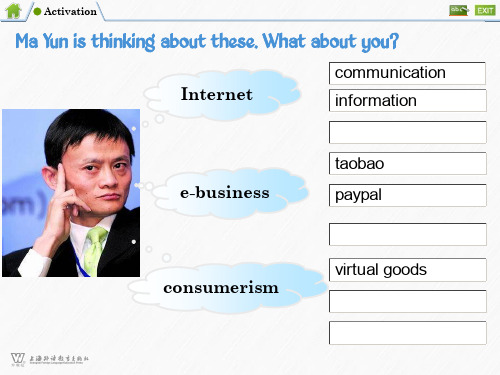
Activation
Do you know these words? Guess their meanings through the corresponding pictures.
Boom
Traffic
Portfolio
Whim
Activation
Do you know these web sites? How can you make use of them?
Kathleen Gilroy, cofounder of Swift Media Networks in Boston, eats, lives and breathes Web 2.0. Not only is her latest business venture focused on Web 2.0 services for conferences, but she's also used just about every Web-based tool there is to run her own various startups. With five full-time staff members, she has become a well-seasoned user of blogs, wikis, collaboration tools and just about any other free or lowcost service she can make use of.
Warm-up
Background
Detailed Reading
TEXT I
The Internet is rapidly evolving from a channel for content distribution to a platform for activity — collaboration, publishing, sharing and innovation. It has currently undergone a comprehensive software upgrade, representing several initiatives collectively known as "Web 2.0." … Simplicity and convenience are driving the rapid adoption of Web 2.0. In 2005 I started reading the blog of the CEO of Sun Microsystems, Jonathan Schwartz. At that time he said, "Simplicity changes the world. Convenience is a force multiplier."
商务英语综合教程第一册

The Graduate Management Admission Council says that foreign students should find out what different schools could do to help them find a job after they receive their degree. Representatives from many companies visit colleges to hire students.
Q2:What does the writer compare college to? Why?
Part 2 (para. 2-4)
This is the main body. The writer describes the confusion and apprehension of a freshman, meanwhile, what college actually is.
Background Information
Choose Your Degree at an American College or University
商务英语综合教程unit1PPT课件
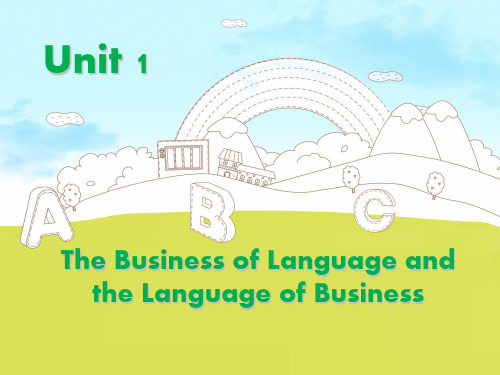
.
10
Grammar
• Tense • Subjunctive mood • Collective nouns • Modal verbs • Prepositions
.
11
British English I’ve just had lunch. Have you washed your hands?
secretary
['sekrɪt(ə)rɪ]
.
['sɛkrətɛrɪ]
8
fertile fragile hostile missile
British English ['fɜːtaɪl] ['frædʒaɪl] ['hɒstaɪl] ['mɪsaɪl]
American English ['fɝtl] ['frædʒəl] ['hɑstl] ['mɪsl]
Unit 1
The Business of Language and the Language of Business
The Business of English
• The development of English • The difference between American
English and British English • The influence of English
.
7
British English
car
[ka:]
American English [kar]
door party board morning
[dɔː] ['pɑːtɪ] [bɔːd] ['mɔːnɪŋ]
综合商务英语一册Unit1Applying for a Job
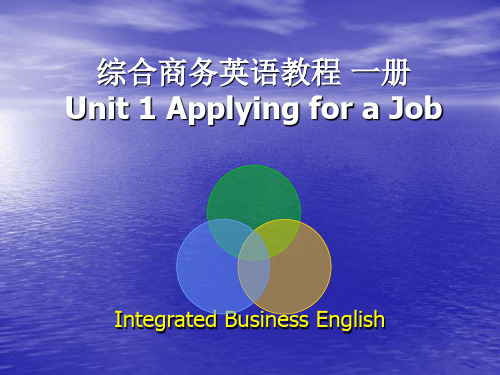
Speaking
Replying I’d like to … I think that… I have the confidence that …
Saying goodbye
Writing
• A business card, or name card, is an
inexpensive way of advertising yourself and the company in formal introductions as a convenience and a memory aid.
• Finance Manager $38,000 • Roper Security is a leading provider of
German security services. We have business operations in China and Korea. The newly-created position of finance manager is to provide assistance in managing. You will report to the general manager and may be required to go overseas to contact clients. You need to have IT skills. Experience of working in the security industry would be preferable.
Speaking
Greetings Pleased to meet you. Nice to meet you. Good to see you.
Introducing yourself My name is …
体验商务英语综合教程1unit1(课堂PPT)
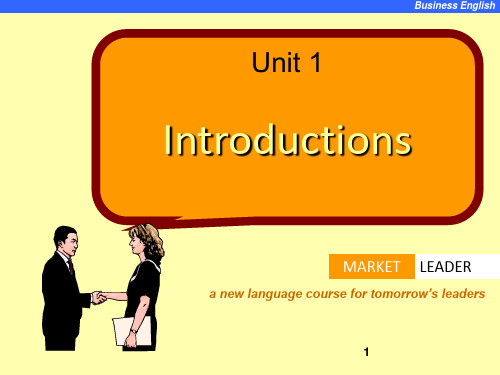
accountant:a professional who examines the financial accounts of businesses or people
product manager:a manager whose job is to supervise the company’s product strategy.
impression.” Why?
3
Business English
Reading aloud practice
No one lives alone in this world. Few people can go without friends. In order to survive or succeed in the working world, we need to group together and form our network of friends and contacts. To get to know people, we always begin by introducing ourselves to each other. Therefore, introductions are important. A good introduction is a good announcement to make others know you well and a proper introduction will give others a good first impression. Studies show that people form their first impression of you within the first few seconds of the meeting – when you are introducing yourselves. Once the first impression is made, it is difficult to change. That’s why people say that you never have a second chance to make a first impression.
新商务英语综合教程1Unit1

professionally
• profession (n. 职业;专业) • professional (adj. 职业的;专业的) • 她唱歌的样子和一个专业歌手一样。 • She sings as if she was a professional singer.
• im (在…只上) + press (压) + ion > 在…上 压> 盖印,压痕 • n. 印象,感觉,模仿,印刷 • expression 表达
• 词根决定词义 • 前缀改变词意 • 后缀改变词性
appearance
• appear 出现 • ance 名词后缀 • 她的外貌和举止都非常讨人喜欢。 • She is most pleasing in manner and appearance.
ceremony
• cere (蜡) + mony (看作money 钱) > 古代 做典礼时,蜡烛和钱是少不了的 • 老校长在毕业典礼上讲的话一直留在我的脑 海里。 • What the old headmaster said at the graduation ceremony dwells in my mind. • Wedding Ceremony • 玉米,花生,谷类 cereal
casually [ˈkæʒuəl] (z >< r)
• casual (adj. 偶然的,临时的,非正式的,漫 不经心的 n. 便装,临时工) • 联想记忆:平常的(usual)时候可以穿非正式 的(casual)服装 • He was wearing business casual (clothes).
academic
综合英语第一册 unit1

Unit 1 Never Say Goodbye.I.Teaching PointsBy the end of this unit, students are supposed tograsp the author’s purpose of writing and make clear the structure of the whole passage through an intensive reading of Text 1 Never Say Goodbye.comprehend the topic sentences in Text 1 thoroughly and be able to paraphrase them.get a list of new words and structures and use them freely in conversation and writing.be aware of the cross-cultural differences in the social behavior of Giving Gifts.II.An integrated Analysis of Text 1 Never Say Goodbye.Topics for discussionWhat was your feeling when you left your parents for the first time and came here?Have your family ever moved from one place to another? If you have, how did you feel when you were going to be away from the old house forgood?Have you ever attended a funeral of some one you know very well? If you have, what were you thinking when you saw him for the last time?Write a letter to your imaginary child to be read on his or her eighteenth birthday. Describe the qualities that you hope he or she will have at this timeof life.HighlightsThe text is the author’s memory of the most important and unforgettabl e experiences when he was between 10 and 12. He had learned from hisgrandfather the profound meaning of “never say goodbye” and became firmand strong-willed as a child. The author wants to tell us that we shouldnever give in to sadness, that we should always be firm and strong-willed, and that we should always remember the joyful and happy events of lifeas well as our cherished friendship.Structural analysis of the text and language pointsThe passage can be divided into three parts.Part One: (Paragraphs 1-4) bringing up the problem the author was confronted with: it is hard to overcome the sadness as the moment of partingdrew near. So he turned to his grandpa for help.Para. 1: beginning of the story ---introducing the backgroundThe author was reluctant and bitterly sad to move away from his old homebecause it was the only home that he was ever known. His whole life,brief as it was, had been spend in that big old house, graceful touchedwith the laughter and tears of four generations.Para. 2-4: the implication of GOODBYE the author learned from hisgrandfather:being too final, too cold for friends to use; implying sadness andunhappiness. The grandfather wanted him to think of joyful and happyevents of life instead of feeling sad and miserable.Part Two: (Paragraphs 5-13) By narrating his sad experience of the loss of his eldest son during the war, the grandpa illustrates how one canovercome the sad feeling resulting from the loss of someone dear to him byrecalling not the moment of parting but the happy times spent together.Para. 5-9: the grandpa’s intention of saying “it isn’t just the roses that arebeautiful; it is that special place in your heart that makes them so.”The grandfather want to:1)1)tell the author a true story of related to the rose bush and hoped toenable him to feel with his heart how beautiful those roses were!2)2)reveal his special associations with the roses and with his sayinggoodbye to his son, as well as to disclose the root cause of his advice notto say goodbye to one’s relatives and friends.Para 10-13: The telling of the story related to the rosebush. The message of the text is conveyed in Para. 13The grandfather want the author:1)1)never to give in to the sadness and the loneliness of the wordgoodbye.2)2)remember instead the joy and happiness of those times when he firstsay hello to a friend.3)3)take that special hello and lock it away with him---in that place in hisheart where summer is an always time.4)4)Reach deep within him and recall that first hello when he and hisfriends must part from each other.Part Three: (Para. 14-20): by the way he behaved when confronted with another sad moment---the loss of his grandpa, the author shows us thathe came to understand what his grandpa had taught him.The parting between the author and his grandfather was so cheerful andpleasant as if they were old friends greeting each other, which showed thathis grandfather adopted an optimistic attitude towards his own death and thatthe author became so strong-willed as not to give in to the sadness.When the author was told that his grandfather had died, he remainedperfectly calm and composed instead of being plunged into sadness.Rememberin g his grandpa’s words, he reached deep within him for thosespecial feelings that had made up their friendship. Suddenly and truly, herealized what his grandfather had meant about never saying goodbye---aboutrefusing to give in to the sadness.nguage pointsConfront:1) be faced with and have to deal withE.g. The actress was confronted by large group of reporters as she left thestage door2)force to deal with or accept the truth of; bring face to face withE.g. When the police confronted her with the evidence, she confessed she wasguilty.Touched with the laughter and tears of four generations:touched with the happiness and bitterness of four generations. The sentence implies that “…the house which had seen and/witnessed the joys and sorrows ofthe four generations of my family.”touch: have an effect on one’s feelings; to cause one to feel pity, sympathy, etc.E.g. His sad story so touched us that we nearly cried.* be touched with: have a certain amount of qualityE.g. Her hair is touched with gray.Well:(of liquid) flow or start to flowE.g. Blood welled (out) form the cut.She was so moved that tears welled (up, forth, out)in her eyes.Linguistic Knowledge:Homonymy: the same phonological structure possessing several unrelated senses.E.g. well & well bank(sloping side of a river) & bank(a financialinstitution)花钱&开花Polysemy : the same phonological structure possessing a set of different but related meaning.E.g. hook 1) a curved material, esp. metal, for holding, catching orsuspending sth. 2) a sharp bend or angle in a geological formation.3)short for fishhook. 4)(Am. E) something that attracts or isintended to be a attraction;……Rest on/upon1)lean on; to be supported by2)(esp. of a proof, argument, etc.) be based on; be grounded on; depend onE.g. Your argument rests on a statement than cannot be proved.Through one’s tears:With tears in one’s eyes; while shedding tearsThrough: among or between the parts or members ofE.g. I searched through my papers for the missing documents.Stare1) look steadily for a long time, esp. in great surprise or shockE.g. He sat staring into space, thinking deeply.2) be very plain to see; to be obviousE.g. The lies in the report stared out at us from every paragraph.* stare off: stare away; to move one’s eyesWhisper:1) speak or say very quietly so that only a person cloze by can hearE.g. She whispered a warning to me and then disappeared.2) (of the wind, etc) make a soft soundE.g. The leaves of the trees were whispering in the wind.Before your mother was even a dream:before you mother was born / before we thought of having a daughter.Pick:1) take what one likes or considers best, or more suitable from a group.E.g. He has been picked to head the planning committee.2) gather; pull or break off (part of a plant) from a tree or a plantE.g. He picked some roses and gave them to his girlfriend.3) take up or remove something separately or bit by bit using the fingers, abeak, a pointed instrument, etc.The dog picked the bone clean.Lock it away within youFasten it firmly in your mind; imprint it on your mind; bear it in your mind and never forget it.…in that place in your heart where summer is an always time.In that place in your heart where there is always sunlight and warmth. / which is always filled with joy and happiness. Here SUMMER is a metaphor.“Always” here is used by the Grandpa as an adjective, which revealed that he was not well-educated. *Sociolinguistic knowledge: Your accent betrays you. IV. Questions for considerationStudents are required to preview the text with the following two questions:What is the text concerned with?What is the message of the text?V. Main ideas of Text 2The Dinner Party, one of the best known short stories of Mona Gardner, takes place in India earlier last century, when India was still a colony ruled by Great Britain. At the very beginning, there is a disagreement between the colonel and a young girl as to whether women are still easy to be scared. Then a snake came into the room, the hostess, with the help of an American, escaped the danger of a possible attack by the cobra. In the story, both the man and the woman demonstrated the marvelous quality of self-controlA topic for discussionGenerally speaking, which sex do you think is braver? Give some details to support your idea.。
现代商务英语综合教程第一册Chapter 1

Unit 1 Business IntroductionBackground caseWarm-up questions1.What accounts for Donald Trump’s business success?2.What can business bring about?3.Please illustrate “attitude is sometimes everything” with Donald Trump’s case.Background InformationDonald J. Trump is a graduate of the Wharton School of Finance and started his business career in an office he shared with his father. In August of 2006, Mr. Trump was voted by BusinessWeek magazine as “the world’s most competitive businessperson.”In New York City, the Trump signature is synonymous with the most prestigious of addresses, among them the world-renowned Fifth Avenue skyscraper, Trump Tower, the Trump International Hotel & Tower, voted the best U.S. Hotel by Conde Nast Traveler, Trump World Tower at the United Nations Plaza, 40 Wall Street, and Trump Park Avenue.In a departure from his real estate acquisitions, Mr. Trump and the NBC Television Network are partners in the ownership and broadcast rights for the three largest beauty competitions in the world: the Miss Universe, Miss USA and Miss Teen USA Pageants. He is also the star and executive producer of the hit television series, “The Apprentice,” which has received national and worldwide attention. In the summer of 2004, his radio program on Clear Channel made its debut and broke all syndication records.Mr. Trump has authored seven books, all of which became bestsellers. Trump Magazine was launched in 2004, Trump University Online in 2005, and the Donald J. Trump licensing program. In 2006, , an online travel agency, made its debut, as did Trump Productions in Los Angeles.Eleven Questions With Donald Trump1.Question: If you, Bill Gates, Steve Jobs, Herb Kelleher and Larry Ellison got maroonedon a desert island, who would end up running the place and who would end up as dinner?Answer: We would find a way to order in and have a productive meeting at the same time.2.Question: How long would Larry and Sergei, the co-founders of Google, last on yourshow?Answer: That would depend on whether they were good team players and if they had an original idea or two.3.Question: Would you fire your son or daughter?Answer: Yes, if they deserved it, but fortunately they are well prepared for their positions, so I doubt they would ever merit being fired.4.Question: What do you do to chill out?Answer: Playing golf provides me with my version of chilling out, plus I develop golfc ourses, so it’s a productive way to spend my chill time.5.Question: At the end of our life, what do you want to be remembered for?Answer: As a builder who has enhanced the cities and communities where I have built and/or developed.6.Question: What’s the difference between the Donald Trump on “The Apprentice” and theDonald Trump in every day business meetings?Answer: Business meetings are more about negotiation skills whereas “The Apprentice”falls into the job interview or audition category. I have business meetings with people who are looking to do business, not people who are looking for a job. My attitude on “The Apprentice” is as an employer looking at possible future employees. I don’t look to mold any of my business associates.7.Question: If you could apprentice with anyone in history, who would it be?Answer: My father was a great mentor. He’d be hard to replace.8.Question: Not many people make billions, lose billions, and then make billions all overagain. How did you pull this off?Answer: To me it was a blip, not a catastrophe. I knew I was destined to succeed, and I kept focused on that belief. I’m very tenacious...and I don’t give up.9.Question: If you graduated from Wharton in 2006 instead of in the 1960s, what industrywould you go into?Answer: Real estate. I love it and it still exists as a career and as a viable passion.10.Question: What do you think of two guys in a garage showing amateur videos selling outfor $1.7 billion?Answer: I’d say they had a great idea—my hat’s off to them.11.Question: TV is TV, real life is real life: What’s the most important real-life advice youcan give to an entrepreneur?Answer: You have to love what you do. Without passion, great success is hard to come by. An entrepreneur will have tough times if he or she isn’t passionate about what they’re doing. People who love what they’re doing don’t give up. It’s never even a consideration. It’s a pretty simple formula.New words: 1. subsequent, 2. boom, 3. anonymous, 4. domination, 5. preoccupation, 6. ethos, 7. pervade, 8. cede, 9. obsessive, 10. frugality1.subsequent= adj. following in time or order; succeeding●Subsequent events proved me wrong. 后来发生的事证明我错了。
外研社新标准商务英语综合教程1
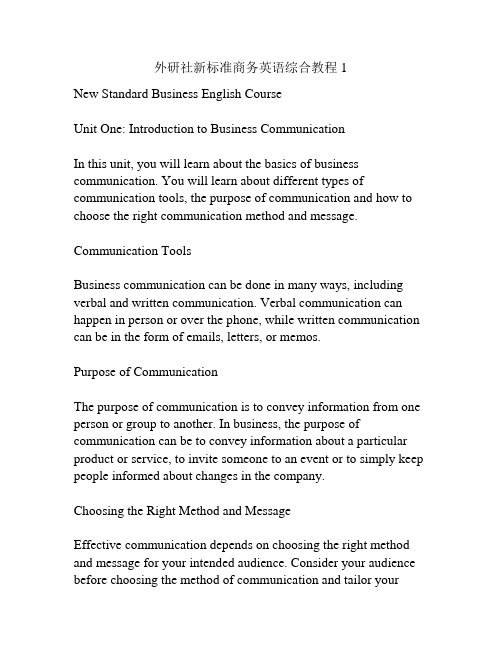
外研社新标准商务英语综合教程1New Standard Business English CourseUnit One: Introduction to Business CommunicationIn this unit, you will learn about the basics of business communication. You will learn about different types of communication tools, the purpose of communication and how to choose the right communication method and message.Communication ToolsBusiness communication can be done in many ways, including verbal and written communication. Verbal communication can happen in person or over the phone, while written communication can be in the form of emails, letters, or memos.Purpose of CommunicationThe purpose of communication is to convey information from one person or group to another. In business, the purpose of communication can be to convey information about a particular product or service, to invite someone to an event or to simply keep people informed about changes in the company.Choosing the Right Method and MessageEffective communication depends on choosing the right method and message for your intended audience. Consider your audience before choosing the method of communication and tailor yourmessage to fit their needs.Unit Two: Business WritingThis unit will focus on writing skills for business. You will learn about formal and informal writing, how to write emails, letters and memos, and how to write an effective business report.Formal and Informal WritingFormal writing is used in professional communication and requires a specific style and tone. Informal writing is used in everyday communication and tends to be less structured and more conversational.Writing Emails, Letters and MemosEmails, letters and memos are all important forms of business communication. In this unit, you will learn the key elements of each type of writing and how to write clear and effective messages.Writing a Business ReportA business report is a formal document that provides information on a particular topic. In this unit, you will learn how to structure a business report, how to collect and analyze data, and how to present your findings effectively.Unit Three: Presentations and Public SpeakingThis unit will teach you how to give effective presentations and become a confident public speaker. You will learn how to structure a presentation, create effective visuals and use body language to convey your message.Structuring a PresentationEffective presentations require careful planning and organization. In this unit, you will learn how to structure a presentation that captures your audience's attention and conveys your message effectively.Creating Effective VisualsVisual aids can enhance the impact of a presentation. In this unit, you will learn how to create effective visual aids that support your message and engage your audience.Using Body LanguageBody language is an important part of communication, especially in public speaking. In this unit, you will learn how to use body language effectively to convey confidence and professionalism.Unit Four: Negotiation SkillsThis unit will teach you the skills needed for successful negotiation in business. You will learn about negotiation styles, techniques and strategies, and how to negotiate effectively with different personalities.Negotiation Styles, Techniques and StrategiesNegotiation requires careful planning and preparation. In this unit, you will learn about different negotiation styles, techniques and strategies that can be used to achieve a successful outcome.Negotiating with Different PersonalitiesEffective negotiation requires an understanding of different personality types. In this unit, you will learn how to identify different personality types and how to adapt your negotiation style to work effectively with each personality type.Unit Five: Cross-Cultural CommunicationIn a global business environment, cross-cultural communication is essential. This unit will teach you how to communicate effectively with people from different cultures and how to avoid common cultural mistakes.Communication Across CulturesDifferent cultures have different communication styles and norms. In this unit, you will learn about different communication styles and how to adapt your own communication style to work effectively with people from different cultures.Avoiding Cultural MistakesCultural differences can lead to misunderstandings and mistakes. In this unit, you will learn how to avoid common cultural mistakes and how to communicate effectively across cultural divides.ConclusionThe New Standard Business English Course is designed to provide you with the skills and knowledge needed to communicate effectively in a business environment. The course covers a range of topics, from business writing and negotiation skills to presentations and cross-cultural communication. By completing this course, you will be well-prepared to communicate confidently and professionally in any business situation.Unit One: Introduction to Business CommunicationCommunication is essential in business, and the ability to communicate effectively can make a significant difference in the success of any endeavor. In Unit One, you will learn about the basics of business communication.The purpose of communication is to convey information from one person or group to another. In business, the purpose of communication can be to convey information about a particular product or service, to invite someone to an event, or to simply keep people informed about changes in the company. Communication can take place verbally or in written form. Verbal communication can happen in person or over the phone, while written communication can be in the form of emails, letters, or memos. Choosing the right method and message for your intendedaudience is essential for effective communication. Consider your audience before choosing the method of communication and tailor your message to fit their needs. For instance, if you are communicating with clients or customers, you may want to use more formal language. In contrast, if you are communicating with colleagues, informal language might be more appropriate.Unit Two: Business WritingEffective writing skills are essential in business. In this unit, you will learn about formal and informal writing, how to write emails, letters, and memos, and how to write an effective business report.Formal writing is used in professional communication and requires a specific style and tone. It is usually used for more official purposes and has a more structured format than informal writing. Informal writing is used in everyday communication and tends to be less structured and more conversational.Emails, letters, and memos are all important forms of business communication. In this unit, you will learn the key elements of each type of writing and how to write clear and effective messages. Writing clear emails is an essential part of business communication, as it is a quick and convenient method of communication. A well-written email can convey your message effectively and make a positive impression on the recipient.A business report is a formal document that provides information on a particular topic. In this unit, you will learn how to structure a business report, how to collect and analyze data, and how topresent your findings effectively.Unit Three: Presentations and Public SpeakingPublic speaking is a crucial skill for business professionals, and the ability to give effective presentations can be a valuable asset. In this unit, you will learn how to structure a presentation, create effective visuals, and use body language to convey your message.Effective presentations require careful planning and organization. In this unit, you will learn how to structure a presentation that captures your audience's attention and conveys your message effectively. The key elements of an effective presentation include an engaging opening, clear objectives, a compelling argument, supportive evidence, and a memorable conclusion.Visual aids can enhance the impact of a presentation. In this unit, you will learn how to create effective visual aids that support your message and engage your audience. The key to creating effective visuals is to keep them simple, relevant, and visually appealing. Body language is an important part of communication, especially in public speaking. In this unit, you will learn how to use body language effectively to convey confidence and professionalism. Effective use of body language can help you connect with your audience and build rapport, making your presentation more effective.Unit Four: Negotiation SkillsNegotiation is an essential part of business, and the ability to negotiate effectively can make a significant difference in the success of any endeavor. In this unit, you will learn about negotiation styles, techniques, and strategies, and how to negotiate effectively with different personalities.Negotiation requires careful planning and preparation. In this unit, you will learn about different negotiation styles, techniques, and strategies that can be used to achieve a successful outcome. By learning how to effectively negotiate, you can better manage conflict, build stronger relationships, and achieve mutually beneficial outcomes.Effective negotiation requires an understanding of different personality types. In this unit, you will learn how to identify different personality types and how to adapt your negotiation style to work effectively with each personality type. By understanding the different communication styles and behavior patterns, you can better navigate the negotiation process and improve your chances of success.Unit Five: Cross-Cultural CommunicationIn today's global business environment, cross-cultural communication is essential. In this unit, you will learn how to communicate effectively with people from different cultures and how to avoid common cultural mistakes.Different cultures have different communication styles and norms. In this unit, you will learn about different communication stylesand how to adapt your own communication style to work effectively with people from different cultures. By understanding cultural differences and adapting your style accordingly, you can better communicate with people from different backgrounds and build stronger relationships.Cultural differences can lead to misunderstandings and mistakes. In this unit, you will learn how to avoid common cultural mistakes and how to communicate effectively across cultural divides. By learning how to navigate cultural differences, you can better understand and engage with people from different cultures, improving your chances of success.ConclusionThe New Standard Business English Course is designed to provide you with the skills and knowledge needed to communicate effectively in a business environment. By completing this course, you will be well-prepared to communicate confidently and professionally in any business situation. With a focus on business writing, presentations and public speaking, negotiation, and cross-cultural communication, this course provides a comprehensive overview of essential skills for success in the workplace.。
综合商务英语1(已完成)MARKET LEADER unit 1

Greetings
I. What’s important about making greetings? 1) Take notice of other people; 2) Be confident to make a good impression; 3) Be polite and genuine;
II. Two ways of making greetings
1) By words
2) For others it refers to the communication skills used in the workplace, and focuses on
the language and skills needed for typical
business communication such as presentations,
MARKET LEADER 1
An Introduction to Business English
I. What is business English? A part of English for Specific Purposes, it is the English language especially related to international trade;
2) Information included:
a) name+identity/status+relationship with the introducer
b) Titles: Mr., Mrs., Miss, Ms., Doctor, Professor, President, etc.
IV. Seven basic rules in business introductions 1) inferiors →superiors; 2) young → older; 3) man→ woman 4) less important → more important 5) married →single 6) staff members →clients 7) individual →group
大学商务英语综合教程unit 1

Grade Evaluation
• Exams: Final 70% (Based on lecture notes and the text)
• Class activity and your attendance for each class is required: 30%
Toyota
Think out as many words, phrases or expressions as possible about business from the event of Toyota’s recalls.
exchange, hotel, restaurant, bank;
Other Terms Frequently Used in Business Operation:
Sell, buy, goods, order, profit, interest, invoice, check, bill, consumer, customer.
The outline of the course
1. Business and economy —— Business sectors and Industries — — Companies (CSR and Business Ethics)
2. Marketing (Marketing strategy/ Integrated Marketing/ direct marketing/ positioning/ personal selling/ AIDA/FABV/SWOT/Branding/ 4Ps)
The Nature of Business
Business is the human activity related涉及 to material things. It is necessary for civilization. It is found in all societies, even the simplest ones. Business may include the production of goods: Making airplanes, building buildings, and constructing构成 paper boxes are examples of production. It can also provide the financing 理财融资 for these activities. Lending money, trading stocks股份and bonds有息债券, and selling insurance保险policies relate to the securing获得 of capital资本for business activities. Other forms of business include merchandising买卖 , which is the selling of products, and providing various services, such as accounting会计, distributing分发 , and repairs. Business, then, is the activity of producing and distributing goods and services.
- 1、下载文档前请自行甄别文档内容的完整性,平台不提供额外的编辑、内容补充、找答案等附加服务。
- 2、"仅部分预览"的文档,不可在线预览部分如存在完整性等问题,可反馈申请退款(可完整预览的文档不适用该条件!)。
- 3、如文档侵犯您的权益,请联系客服反馈,我们会尽快为您处理(人工客服工作时间:9:00-18:30)。
Unit 1 Business IntroductionBackground caseWarm-up questions1.What accounts for Donald Trump’s business success?2.What can business bring about?3.Please illustrate “attitude is sometimes everything” with Donald Trump’s case.Background InformationDonald J. Trump is a graduate of the Wharton School of Finance and started his business career in an office he shared with his father. In August of 2006, Mr. Trump was voted by BusinessWeek magazine as “the world’s most competitive businessperson.”In New York City, the Trump signature is synonymous with the most prestigious of addresses, among them the world-renowned Fifth Avenue skyscraper, Trump Tower, the Trump International Hotel & Tower, voted the best U.S. Hotel by Conde Nast Traveler, Trump World Tower at the United Nations Plaza, 40 Wall Street, and Trump Park Avenue.In a departure from his real estate acquisitions, Mr. Trump and the NBC Television Network are partners in the ownership and broadcast rights for the three largest beauty competitions in the world: the Miss Universe, Miss USA and Miss Teen USA Pageants. He is also the star and executive producer of the hit television series, “The Apprentice,” which has received national and worldwide attention. In the summer of 2004, his radio program on Clear Channel made its debut and broke all syndication records.Mr. Trump has authored seven books, all of which became bestsellers. Trump Magazine was launched in 2004, Trump University Online in 2005, and the Donald J. Trump licensing program. In 2006, , an online travel agency, made its debut, as did Trump Productions in Los Angeles.Eleven Questions With Donald Trump1.Question: If you, Bill Gates, Steve Jobs, Herb Kelleher and Larry Ellison got maroonedon a desert island, who would end up running the place and who would end up as dinner?Answer: We would find a way to order in and have a productive meeting at the same time.2.Question: How long would Larry and Sergei, the co-founders of Google, last on yourshow?Answer: That would depend on whether they were good team players and if they had an original idea or two.3.Question: Would you fire your son or daughter?Answer: Yes, if they deserved it, but fortunately they are well prepared for their positions, so I doubt they would ever merit being fired.4.Question: What do you do to chill out?Answer: Playing golf provides me with my version of chilling out, plus I develop golfc ourses, so it’s a productive way to spend my chill time.5.Question: At the end of our life, what do you want to be remembered for?Answer: As a builder who has enhanced the cities and communities where I have built and/or developed.6.Question: What’s the difference between the Donald Trump on “The Apprentice” and theDonald Trump in every day business meetings?Answer: Business meetings are more about negotiation skills whereas “The Apprentice”falls into the job interview or audition category. I have business meetings with people who are looking to do business, not people who are looking for a job. My attitude on “The Apprentice” is as an employer looking at possible future employees. I don’t look to mold any of my business associates.7.Question: If you could apprentice with anyone in history, who would it be?Answer: My father was a great mentor. He’d be hard to replace.8.Question: Not many people make billions, lose billions, and then make billions all overagain. How did you pull this off?Answer: To me it was a blip, not a catastrophe. I knew I was destined to succeed, and I kept focused on that belief. I’m very tenacious...and I don’t give up.9.Question: If you graduated from Wharton in 2006 instead of in the 1960s, what industrywould you go into?Answer: Real estate. I love it and it still exists as a career and as a viable passion.10.Question: What do you think of two guys in a garage showing amateur videos selling outfor $1.7 billion?Answer: I’d say they had a great idea—my hat’s off to them.11.Question: TV is TV, real life is real life: What’s the most important real-life advice youcan give to an entrepreneur?Answer: You have to love what you do. Without passion, great success is hard to come by. An entrepreneur will have tough times if he or she isn’t passionate about what they’re doing. People who love what they’re doing don’t give up. It’s never even a consideration. It’s a pretty simple formula.New words: 1. subsequent, 2. boom, 3. anonymous, 4. domination, 5. preoccupation, 6. ethos, 7. pervade, 8. cede, 9. obsessive, 10. frugality1.subsequent= adj. following in time or order; succeeding●Subsequent events proved me wrong. 后来发生的事证明我错了。
